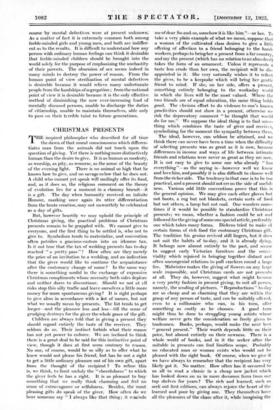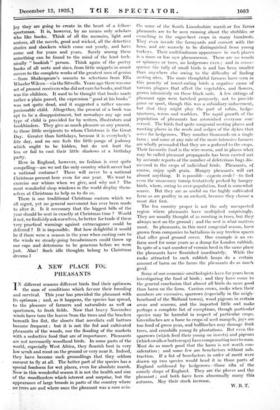CHRISTMAS PRESENTS
THE inspired philosopher who described for all time the dawn of that moral consciousness which differen- tiates man from the animals did not touch upon the question of giving. Yet there is nothing more distinctively human than the desire to give. It is as human as modesty, as worship, as pity, as remorse, as the sense of the beauty of the evening light. There is no animal so high that he knows how to give, and no savage so low that he does not. A child who cannot yet speak will smilingly offer its food,. and, as it. does so, the religious comment on the theory of evolution lies for a moment in a clammy biscuit—it is a gift. The day when humanity received an infinite Honour, marking once again its utter differentiation from the brute creation, may not unworthily be celebrated as a day of gifts.
But, however heartily we may uphold the principle of Christmas giving, the practical problems of Christmas presents remain to be grappled with. We cannot give to everyone, and the first thing to be settled is, who not to give to. Symbolism tends to materialize, and convention often petrifies a gracious custom into an irksome tax.
Is it not true that the tax of wedding presents has to-day reached " a pretty pass "? How often are they merely the price of an invitation to a wedding, and an indication that the giver would hire to continue the acquaintanee- after the customary change of name? In the same way there is something sordid in the exchange of expensive Christmas compliments whose necessity both sides deplore and neither dares to discontinue. Should we not at all risks stop this silly traffic and leave ourselves a little more money for more spontaneous giving? It is right perhaps to give alms in accordance with a list of names, but not what we usually mean by presents. The list tends to get- longer—and the pleasure less and less—till the sense of grudging destroys for the giver the whole grace of the gift. Children are always told that in giving a present they- should regard entirely the taste of the receiver. They seldom do so. Their instinct forbids what their reason has not yet power to enforce. We are inclined to think- there is a great deal to be said for this instinctive point of view, though it does at first seem contrary to reason.
No one, of course, would be so silly as to offer what he knew would not please his friend, but has he not a right to get a little ordinary pleasure out of his own gift, apart from the thought of the recipient ? To refuse this is, we think, to limit unduly the " cheerfulness " to which the giver feels he has a right. It is so pleasant to buy something that we really think charming and _feel no sense of -extravagance or selfishness. Besides, the 'inoSt pleasing gifts do speak of the giver. How often do we hear someone say " I always like that thing; it a minds me of dear So-and-so, somehow it is like hirn"—or her. To take a very plain example of -what we mesa-suppose that a woman of the cultivated class desires to give a little offering of affection to a friend belonging to the hand- workers, perhaps to hringher a present from a far country, and say the present (which_ has no relation to an alms deed) takes the form of an ornament. Unless it represents a taste less crude than her own, the recipient will be dis- appointed in it. - She very naturally wishes it to reflect the giver, to be a keepsake which will bring her gentle friend to mind. If she, on her side, offers a present, something entirely belonging to the workaday world in which she lives will he the most valued. Where the two friends are of equal education, the same thing holds good. The chylous effort to do violence to one's known proclivities should not show in a present, otherwise we risk the deprecatory comment " he thought that would do for me." We suppose the ideal thing is to find some- thing which combines the taste of giver and receiver, symbolizing for the moment the sympathy between them.
The ideal, however, can seldom be attained, and we think there can never have been a time when the difficulty of selecting presents was as great as it is now, because differences in income and ways of life between intimate friends and relations were never as great as they are now. It is not easy to give to some one who already " has everything "—as the saying is—however well we know and love him, and possibly it is also difficult to choose well from the richer side. The tendency in that case is to be too practical, and a present should not err on the side of useful- ness. Various odd little conventions prove that this is the general opinion. We may give each other gloves but not boots, a rug but not blankets, certain sorts of -food but not others, a lamp but not coal. One wonders some- times if it would be possible to standardize Christmas presents; we mean, whether a fashion could be set and followed for the giving of some one special article, preferably one which takes many forms. Dickens tried to make of certain forms of rich food the customary Christmas gift. The tradition his genius revived still lingers, but it does not suit the habits of to-day, and it is already dying. It belongs now almost entirely to the past, and seems to suggest early Victorian furniture and the convi- viality which rejoiced in bringing together distant and often uncongenial relations to pull crackers round a large fire. Midwinter makes the giving of flowers on any large scale impossible, and Christmas cards are not presents at all. They do, however, suggest what might become a very pretty fashion in present giving, to suit all purses, namely, the sending of pictures. Reproductions " to-day are so cheap and so charming that they are within the grasp of any person of taste, and can be suitably offered, even to a millionaire who can, in his turn, offer something as costly as he chooses. A good turn Might thus be done to struggling young artists whose welfare never gets the consideration so freely given to tradesmen. Books, perhaps, would make the next best " general present." Their worth depends little on their price, but almost entirely on their newness. There is a whole world of books, and in it the seeker after the suitable in presents can find limitless scope. Probably no educated man or woman exists who would- not be pleased with the right book. Of course, when we give it we have always to remember that the recipient has very likely got it. No matter: How often has it occurred to us all to read a classic in a cheap new jacket which has looked down on us in more decorous form- from our top shelves for years? The rich and learned, such as seek out first editions, can always rejoice -the heart -of the learned and poor by giving one. They themselves have all the pleasures of the chase after it, while imagining the joy they are going to create in the heart of a fellow- sportsman. It is, however, by no means only scholars who like books. Think of all the memoirs, light and serious, all the novels, good and wicked, all the detective stories and shockers which come out yearly, and have come out for years and years. Surely among these something can be, found to the mind of the least tech- nically " bookish " person. Think again of the poetry books of all sorts and sizes, from little snippets in smart covers to the complete works of the greatest men of genius —from Shakespeare's sonnets to selections from Ella Wheeler Wilcox—via the Sitwells. Years ago there was one set of present receivers who did not care for books, and that was the children. It used to be thought that books made rather a plain parcel, the expression " good at his books" was not quite dead, and it suggested a rather uncom- panionable child. Altogether, the present of a book was apt to be a disappointment, but nowadays any age and type of child is provided for by writers, illustrators and bookbinders. They give as much pleasure as any present, to those little recipients to whom Christmas is the Great Day. Greater than birthdays, because it is everybody's fete day, and no one feels the little pangs of jealousy which ought to be hidden, but do not hurt the less or fail to cast their little shadows at a birthday party.
Here in England, however, no fashion is ever quite compelling—are we not the only country which never had a national costume? There will never be a national Christmas present here even for one year. We want to exercise our whims when we give, and why not ? The most wonderful shop windows in the world display them- selves at Christmas to help us to do so.
There is one traditional Christmas custom which we all regret, yet no general movement has ever been made to alter it. Is it necessary that the biggest bills of the year should be sent in exactly at Christmas time ? Would it not, we foolishly ask ourselves, be better for trade if these very practical warnings against extravagance could be deferred ? It is impossible. But how delightful it would be if there were a season in the year when casting care to the winds we steady-going breadwinners could throw up our caps and determine to be generous before we were just. Alas! Such idle thoughts belong to Christmas dreams I























































 Previous page
Previous page